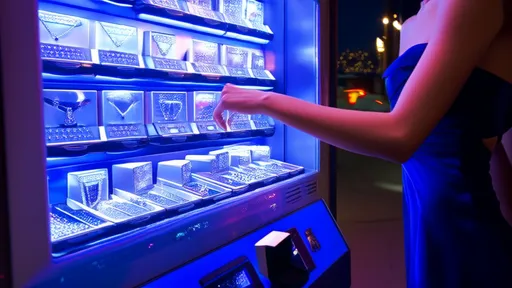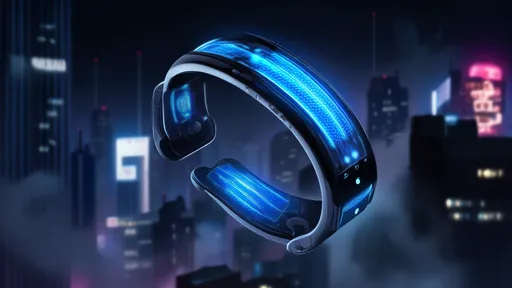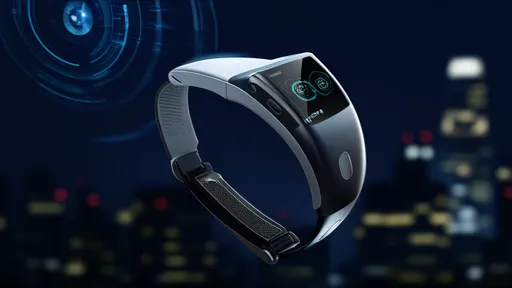In the quiet hum of Shanghai's financial district, a young professional taps her rose-gold bracelet against a metro turnstile. The device flashes green, granting access not just to the subway but to a hidden world of privileges - priority hospital appointments, express airport security, even dating app visibility. This is no ordinary fitness tracker, but a social credit scoring bracelet, the physical manifestation of China's controversial citizen-ranking system.
The concept sounds ripped from a Black Mirror episode, yet these sleek wearables have become disturbingly normalized among China's urban elite. Manufactured by tech giants like Alibaba and Tencent, the bracelets sync with government databases to display real-time social credit scores through color-coded LED indicators. Green signals exemplary citizenship (750+ points), blue denotes average compliance (600-749), while red flashes warnings for sub-600 scores - a modern-day scarlet letter.
Behind the polished silicone bands lies an architecture of surveillance that would make Orwell blanch. The devices aggregate data from facial recognition cameras, mobile payment histories, even social media activity. One Beijing wearer we interviewed (who requested anonymity) described how her bracelet vibrated when she lingered near a protest: "It wasn't a notification, just this... pulse. Like the system was breathing down my neck."
What began as a pilot program in 2014 has metastasized into a full-fledged caste system. High scorers enjoy VIP treatment at luxury boutiques and private schools, their bracelets serving as golden tickets. At a Shenzhen Tesla dealership, sales staff reportedly prioritize customers based on wristband colors - a practice the automaker denies endorsing. Meanwhile, low-scoring citizens find themselves barred from premium train seats or blocked from high-speed internet packages.
The psychological impact is profound. Sociologists observe "credit anxiety" spreading through middle-class communities, where parents obsess over point fluctuations like Wall Street traders monitoring stocks. A viral video showed a Shanghai mother scolding her child for jaywalking: "Do you want mommy's bracelet to turn red? Who will accept you to good kindergarten then?" The clip garnered millions of likes before being scrubbed from platforms.
Tech dissidents have attempted to game the system. Hackers in Guangzhou developed "score boosters" - Bluetooth apps that simulate virtuous behaviors like donating to state charities. Authorities responded by embedding quantum encryption chips in newer bracelet models. Last month, police arrested a black market merchant selling counterfeit high-score bands to migrant workers. The irony? His own bracelet reportedly dimmed to red during the arrest.
Western corporations walk a tightrope. While Starbucks offers free lattes to top-tier scorers, Apple quietly discontinued its compatible watch band after congressional scrutiny. "We don't judge how sovereign nations administer justice," hedged a Microsoft spokesperson when questioned about their cloud infrastructure supporting the system. Human rights groups estimate over 200 million Chinese now wear the trackers voluntarily, with another 300 million mandated through employer programs.
As night falls over Beijing's Sanlitun district, the bracelets glow like fireflies - some emerald, some crimson, all pulsating with silent judgment. A university student wearing two bands (his and his demoted father's) whispers over bubble tea: "We used to envy people with Rolexes. Now we check wrists for colors." The remark hangs in the air, heavier than the smog outside. In this neon-lit dystopia, social capital isn't measured in yuan or bitcoin, but in the cold calculus of compliance - one LED flicker at a time.
The most chilling aspect? How effortlessly the technology blends into daily life. The bracelets track sleep patterns, monitor heart rates, even nudge users toward "patriotic" exercise routes past propaganda billboards. At a Nanjing elementary school, children earn "credit petals" that sync to their parents' scores. During Lunar New Year, relatives compare not just salaries and spouses, but the luminosity of their wrist displays.
Yet cracks appear in the facade. Rural elders struggle with the tech, their scores plummeting due to "inactivity." Artists have staged performances where bracelets are submerged in liquid nitrogen - freezing the LEDs mid-pulse as commentary on social mobility. Most provocative are the "gray wearers," urban professionals who maintain 649 scores deliberately, hovering just below elite status while avoiding scrutiny. "It's like living in the eyelid of the system," one confessed.
As the program expands to incorporate AI mood analysis and biometric stress monitoring, ethical debates rage. Proponents argue the bracelets reduced crime and increased organ donor registration. Critics see a Pavlovian experiment in social control. The truth likely lies somewhere in the spectrum between - a tool that rewards and punishes, connects and isolates, all while glowing softly on the wrists of a civilization rewriting the social contract one algorithm at a time.

By /Jul 4, 2025

By /Jul 4, 2025

By /Jul 4, 2025

By /Jul 4, 2025

By /Jul 4, 2025

By /Jul 4, 2025

By /Jul 4, 2025

By /Jul 4, 2025

By /Jul 4, 2025

By /Jul 4, 2025

By /Jul 4, 2025

By /Jul 4, 2025

By /Jul 4, 2025

By /Jul 4, 2025

By /Jul 4, 2025

By /Jul 4, 2025

By /Jul 4, 2025

By /Jul 4, 2025

By /Jul 4, 2025

By /Jul 4, 2025